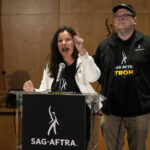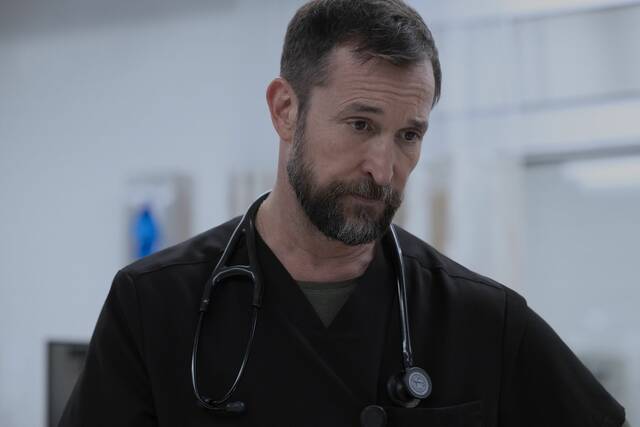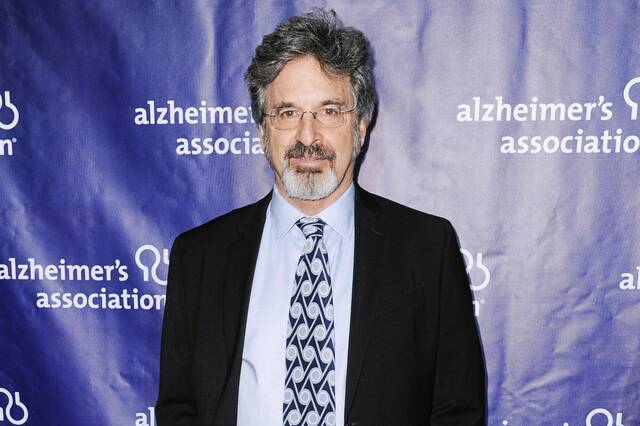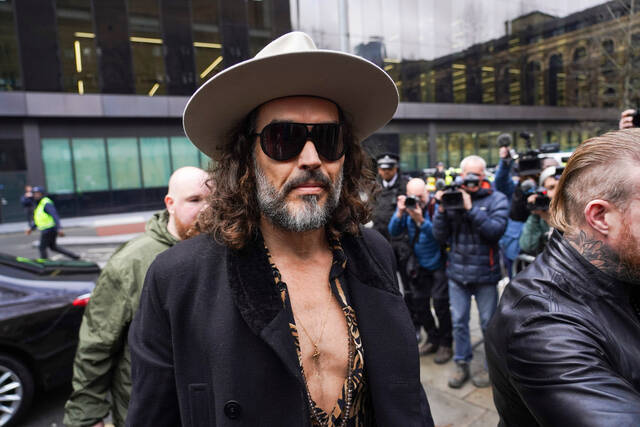Actors’ union SAG-AFTRA is now on strike, joining members of the Writers Guild of America picketing against the Alliance of Motion Picture and Television Producers, which represents Hollywood’s major studios.
It’s the first film and TV actors’ strike since 1986 and the first time both actors and writers have been on strike simultaneously since 1960, when former U.S. President Ronald Reagan was president of the Screen Actors Guild.
“People have a very wrong thought that if you’re on TV once you’re a millionaire — that’s not true for somebody who does a guest star [role],” said Swissvale native Billy Gardell (“Bob [Hearts] Abishola”) late Thursday after arriving in Pittsburgh for an appearance at this weekend’s ‘DVE Comedy Fest. “I’ve been very, very blessed in what’s happened to me. That’s a 1% shot that happened and I understand that. The reason I stand with SAG-AFTRA and the WGA in striking is I do understand the journeyman thing. I have been there. … The idea that [companies] can now broadcast shows worldwide as many times as they want and not pay the actors, directors or writers for the work they put in, to me it’s very greedy and very corporate-driven and I hope that we can find a resolution for this.”
Locally, the SAG-AFTRA strike will have little immediate impact. Due to the writers’ strike, there were no SAG-AFTRA productions up and running in Western Pennsylvania.
Although many local newscasters are members of SAG-AFTRA, they work under separate news contracts that are negotiated locally and are not a part of the current national actors’ strike.
Local viewers will notice the impact of the SAG-AFTRA strike on the national entertainment stage. Late night shows have been in reruns due to the writers’ strike, but now actors will no longer appear to promote film and TV/streaming shows created by the struck companies (Disney, Warner Bros., Paramount Global, etc.) on morning programs like “Today” and “Good Morning America.”
Splashy red-carpet premieres will no longer be star-studded affairs as actors stay home. If a deal is not reached before the Aug. 30 start of the Venice Film Festival, actors in the festival’s films produced by AMPTP signatories will not be present. The same will be true for the Toronto Film festival in September. Actors will also pull out of appearances at Comic Con in San Diego, which begins July 20. The Television Critics Association summer 2023 press tour was already canceled due to the writers’ strike and now actors will not participate in any press days for films/TV and streaming series for the duration of the actors’ strike. Actors won’t promote their projects on social media either.
The writers’ strike already severely curtailed domestic production and with the actors on strike, it’s expected that almost all American film and TV production will grind to a halt with a few exceptions, including season two of HBO’s “House of the Dragon,” whose cast is primarily British working in England under contracts governed by the British union Equity, which is not allowed to strike in solidarity with the U.S. union under British law.
Already the fall TV season has been compromised. This week, The CW and Fox announced fall schedules heavy on reality programming. Though not yet announced, ABC, CBS and NBC will soon follow suit as new episodes of scripted series like “Grey’s Anatomy,” “NCIS” and “Night Court” have not yet been written let alone filmed (new shows for fall usually begin production in late July/early August). Scripted programs won’t be able to go into production until both the writers’ and actors’ strikes end.
The Directors Guild of America negotiated a new contract with the AMPTP this summer, but the nature of a director’s job, especially in TV/streaming, is substantially different: Directors often parachute in to direct an episode and then depart; actors and writers are with series over the long haul.
Like writers from Western Pennsylvania who are on strike and walking picket lines in Los Angeles and New York, actors with Pittsburgh ties say the issues facing writers and actors are similar.
“Television, however it is transmitted to people, is a writers’ medium and the writers run the shows,” said actor David Conrad, an Edgewood native. “Their relationships with their actors, if the shows go for a while, are very close.”
Conrad said his biggest concern among the myriad issues that SAG and the AMPTP remain at an impasse over – money, regulation over artificial intelligence, better benefit plans and compensation for self-taped auditions that arrived with the pandemic and have stuck around – is transparency over how many people are watching streaming shows and improved residual compensation.
“Who’s watching and who isn’t?” Conrad said Thursday during a Facetime interview from his home in London. “The fact that they don’t pay residuals anymore for most streaming services is absurd.”
The issue of residuals is also at the forefront of writers’ concerns. Both writers and actors rely on residuals to help get them — particularly journeyman actors and writers who are not big names — through fallow periods in their careers. Residual payment formulas for reruns of shows on broadcast television are robust; on streaming, they can amount to pennies. (Even for those still working in broadcast TV, shows get rerun much less often than they once did, reducing residual payments to actors and writers.)
This week, The New Yorker noted that Kimiko Glenn, an actor on Netflix hit “Orange is the New Black,” received a residual accounting showing four cents here, two cents there, adding to a check for just $27.33.
Actor Brendan Fehr, a series regular on NBC’s “The Night Shift” and The WB’s “Roswell,” tweeted that actors must make $26,470 annually through working or through residuals to qualify for SAG-AFTRA health insurance. He’s only met that threshold once in the past three years – and he’s had three movies released in the past three months.
Part of the challenge is streamers do not share data that quantifies the success of streaming shows, a sea change from the broadcast and cable television era when the Top 10-rated shows, per Nielsen, were published in newspapers weekly. SAG-AFTRA leaders insist some form of performance-based pay formula around residuals is essential to maintain professional acting as a viable career.
“[Streamers] pay a pittance of residuals,” said actor Jonathan Adams, a Wilkinsburg native who starred on the 2011-21 sitcom “Last Man Standing” and the 2002-05 drama “American Dreams.” “I’ve been involved in series that have run for years, shows that can do 16-22 episodes a season. But that’s not the way it is for most actors anymore.”
Adams notes because he receives those broadcast network show residuals, he’ll be better able to weather a strike.
“If I were doing something that was on a streaming service, I would not be able to make a living and pay my mortgage and whatnot,” Adams said. He also mentioned concern about burdensome self-tape auditions, which require actors to double as cinematographers and tech experts. “For covid reasons I understood not coming in to do auditions and doing all those auditions [from home], but it is a burden to make those things work and I think we should all get back in the [audition] room.”
Gardell, who has picketed with writers already and will join his fellow SAG-AFTRA members on the picket line when he returns to Los Angeles next week, expressed concern about the role of artificial intelligence in creating performances.
“They have to put guardrails on that, otherwise it’s just gonna be a reflection of art instead of real art. You rob the soul of art when you start just feeding things into an algorithm and letting it spit out a version of something that’s already been done,” he said. “I’m not a fan of AI period, even in society. It’s going to hurt a lot of working-class people. Go into your grocery store, you see one checkout person and nine do-it-yourself lanes. I think there’s some good things [about AI] that can be useful, but if we don’t regulate it and we’re not smart about it, it could really be a dangerous thing.”
A common denominator between writers’ and actors’ concerns is how media companies went all-in on streaming – spending billions on streaming services, most of which are not profitable – and wrecked the business model that worked well for all involved for generations.
“They created an unsustainable [model],” Conrad said. “Everybody followed Netlifx down that road and basically bankrupted themselves. It’s not our fault that they made bad business decisions.”
Less in companies’ control but still worrisome for the future of the entertainment industry: Theatrical box office is down more than 25% from the pre-covid era and linear TV continues to erode.
The AMPTP has largely remained silent throughout the writers’ strike until earlier this week when anonymous quotes in a Deadline.com article attributed to a studio executive enraged writers and likely emboldened actors’ union members.
A producer aligned with the AMPTP said studio negotiators don’t intend to resume talks with the WGA until late October.
“The endgame is to allow things to drag on until union members start losing their apartments and losing their houses,” the anonymous source told Deadline, a cold-as-ice approach that one insider called “a cruel but necessary evil.”
On Twitter, writer Hallie Haglund said the “ghoulishness of these quotes kind of took my breath away” while also questioning how “necessary” it is for Warner Bros. Discovery CEO David Zaslav to make $246 million in one year.
On CNBC’s “Squawk Box” Thursday morning, Walt Disney Company CEO Bob Iger, who this week had his contract with Disney extended to 2026 at $27 million per year with the potential for a bonus of an additional $5 million annually if certain targets are met, called the prospect of a strike by the actors “very disturbing to me.
“We’ve talked about disruptive forces on this business and all the challenges we’re facing, the recovery from covid, which is ongoing, it’s not completely back,” Iger said. “This is the worst time in the world to add to that disruption. … There’s a level of expectation that they have, that is just not realistic. And they are adding to the set of challenges that this business is already facing that is, quite frankly, very disruptive.”
Late Wednesday, the AMPTP released a statement, accusing SAG-AFTRA of dismissing “our offer of historic pay and residual increases, substantially higher caps on pension and health contributions, audition protections, shortened series option periods, a groundbreaking AI proposal that protects actors’ digital likenesses and more.”
But SAG-AFTRA chief negotiator Duncan Crabtree-Ireland denounced an AMPTP AI proposal that he said would pay background performers for one day of work in exchange for the rights to their digital likeness “for the rest of eternity with no compensation. If you think that’s a groundbreaking proposal, I suggest you think again.”
In a fiery press conference Thursday, SAG-AFTRA president Fran Drescher (“The Nanny”) said the headwinds facing actors is not unique to their profession.
“When employers make Wall Street and greed their priority and they forget about the essential contributors that make the machine run, we have a problem,” she said. “I went in in earnest thinking that we would be able to avert a strike. … We are being victimized by a very greedy entity. I am shocked by the way the people that we have been in business with are treating us. I cannot believe it, quite frankly, how far apart we are on so many things, how they plead poverty, that they’re losing money left and right when giving hundreds of millions of dollars to their CEOs. It is disgusting. Shame on them. They stand on the wrong side of history.”











